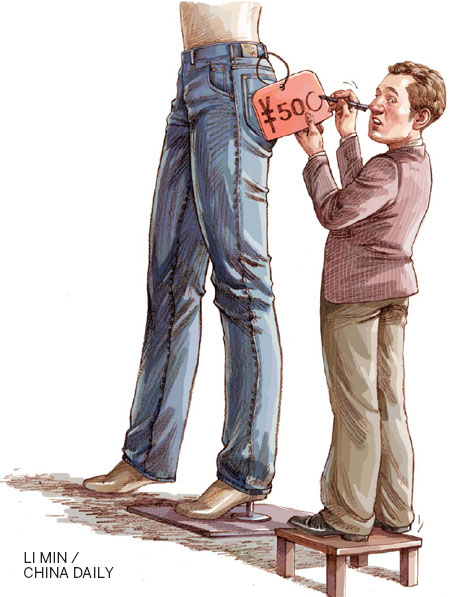
Expensive affair
In modern society, pricing by cost is already too old-fashioned, especially when it comes to the service industry, brand experts say. Instead, "total experience" is fast becoming the selling point and also the money engine for international companies.
"You don't calculate the cost and then decide the price; that's really what we did 20 years ago," says Daniel Lutz, senior vice-president of Nestle Ltd, Greater China region. "Today we sell value to customers."
The pricing is dependent on consumer expectations, he says. "For example, if an ice cream is only for cooling down, you just need to make something from water and sugar, which will be very cheap; but if the customers' expectation is to indulge, they would like to pay more for products with milky chocolate and almonds on the top, which can be more expensive than the cost of the ingredients."
Coffee chains like Starbucks and Costa are companies that cater to this philosophy. Unlike the street corner coffee shops for "grab and go" that are common in Western countries, the two coffee chains have a more relaxed European aura at their Chinese stores: gentle lighting, soft music, comfortable couches and a smile pattern made of chocolate floating on the surface of the coffee.
As a country with a tea culture lasting thousands of years, Chinese customers did not really take to the innovations in the beginning. But the exotic atmosphere soon attracted many youngsters and executives.
The international pleasure experience does not come cheap. While thirsty people can get a good bottled coffee for 6 yuan in the convenience store, they have to shell out 25-40 yuan for a cup of coffee in Starbucks or Costa.
The over-popularity of these shops sometimes even becomes annoying to the owners. Addicted Chinese customers sit in the coffee shop all day long nursing a coffee and listening to music, thereby leading to lower customer footfalls than in Western countries.
In the US and Europe, Starbucks is identified with high quality but is not necessarily exclusive, says Mike Bastin, a researcher from the School of Contemporary Chinese Studies at Nottingham University. "But in China, Starbucks has a different meaning and is seen as a brand from America, and easily associated with a positive American image.
"Urban people like to reward themselves with these slightly expensive products to make them feel different and exclusive. If Starbucks lowers the price, it might cost the exclusivity of the brand, and customer erosion," he says.
Gavin White, group general manager of glo London, a British casual dining brand, finds similar preferences among his customers.
Although White was told to vary the tastes to cater to Chinese customers, he soon found out that customers want authentic and original British taste.
A year ago when the brand opened its first restaurant in Shanghai, nearly 70 percent of the customers were expats and 30 percent Chinese, but now the situation is completely reversed. Most of the customers at the outlet are in their 30s or 40s, mainly middle-class customers "coming to get an international dining experience", White says.
In a regular Chinese restaurant, it costs 50-100 yuan per person for a decent dinner in Shanghai, whereas the average price for a meal in glo London is 150-200 yuan.
White says that although the company's pricing principle is "keeping it reasonable while making a decent margin", he has his own complaints on the price.
Although there are some importers in Shanghai selling British ingredients, the prices of these materials are often very high. "If you go to the city market where there are imported foods, their prices are ridiculous. We have to charge slightly more than we want because the costs of the important ingredients are very high."
Indeed, it is not cheap to create international experiences - the rent in first-tier cities is soaring along with the property price, while staffing is getting pricier.
"In terms of staffing, Shanghai is no longer cheaper than London, especially if you are looking for English-speaking staff," White says. "The staff turnover is probably the highest; rent is on par, and we pay more for electricity and gas than we pay in the UK."
Gong says the higher prices have created a sense of "exclusivity" for customers.
"If Starbucks lowers its price, the store will be packed with people using free wi-fi; and the same principle applies to other Western restaurants: a low price will attract more customers, which will spoil the overall environment; and the staff will need to work more for the same margin which they can easily gain by charging more."

 Overdue loans pile pressure on lenders
Overdue loans pile pressure on lenders Japanese automakers face tough times in China
Japanese automakers face tough times in China Volvo plans expansion amid slowdown
Volvo plans expansion amid slowdown